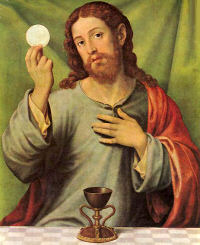Take it; this is my body. (Mark 14:22)
Have you ever had the experience of recalling a past event, or a person whom you once knew, and having that memory be so vivid that it’s as if you were reliving the event, or encountering that person all over again? This is how powerful our capacity for memory can be, and it gives us a glimpse into what can happen whenever we celebrate the Eucharist.
Jesus promised that anyone who eats his flesh and drinks his blood abides in him, just as he abides in them (John 6:56). But this “abiding” isn’t automatic. It comes as we remember at Mass, bringing to the forefront of our minds who Jesus is and all he did for us on the cross. But to remember in this way is not just an activity of the mind, it is an act of the will and of the heart.
So what are we to remember? First and foremost, we are to recall the great love Jesus has for us. It’s a personal love, a love in which he sees all our strengths and weaknesses—all our goodness and failures—and treasures us as his very own. We remember that this is the same Jesus who was with the Father from the beginning, the exact representation of the Father’s being who sustains all things by his word. We remember that he was sent by the Father to rescue us and to bring us the precious gift of salvation. We remember that in his death he has destroyed the power of sin forever.
We also remember that in Christ, there is no condemnation, because through him we have been set free from the law of sin and death. And we remember that as we eat of his body and drink his blood, we are healed, transformed, strengthened, comforted, and united with the entire body of Christ, throughout the world—and even in heaven itself. Truly, our God has given us a precious gift in his own body and blood!
“Lord Jesus, let me never forget you! May my celebration of your death and resurrection bring your power into my life in a new way this day.”
Questions for Reflection or Group Discussion
(Exodus 24:3-8: Psalm 116:12-13,15-18; Hebrews 9:11-15; Mark 14:12-16,22-26)
1. In today’s first readings, we are presented with Old Testament rituals of the sacrificial blood of animals. In what ways do these rituals pre-figure the Blood of Christ and the new covenant?
2. In the Responsorial Psalm, we are called to offer the Lord a “sacrifice of thanksgiving” as a “return to the Lord for all the good he has done for me.” What are the ways you give this “offering of thanksgiving” to the Lord in your own life? What more can you do to “increase” you offering?
3. In the second reading, no longer are there to be sacrifices of animals. God’s new covenant with us, a covenant of love and intimacy has been sealed with the Body and Blood of Christ. How would you explain the Father’s great love for us in allowing his Son to suffer and shed his blood for us? In what ways can we lay down our lives more fully for Jesus Christ and for one another?
4. In the Gospel, we learn that the Body and Blood of Christ is really present in the Eucharist. It is the symbol and bond of unity between Christ and his faithful followers who feed on it. How can you further your unity with Christ, and with your fellow Catholics, who also partake of the body and blood of Christ through the Eucharist?
5. In the meditation, we hear these words: “Jesus promised that anyone who eats his flesh and drinks his blood abides in him, just as he abides in them (John 6:56). But this ‘abiding’ isn’t automatic. It comes as we remember at Mass, bringing to the forefront of our minds who Jesus is and all he did for us on the cross.” The meditation goes on to describe some of the things we ought to remember. In your own words, how would you describe the things to remember?
6. What steps can you take to better prepare yourself to receive Christ in the Eucharist? How can you use the Eucharist to draw nearer to Jesus? To the Holy Spirit? To the Father?
7. Take some time now to pray for the grace to experience more deeply the Lord’s life and power in your life at Mass and when you receive the Eucharist. Use the prayer at the end of the meditation as the starting point.
